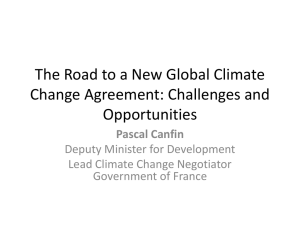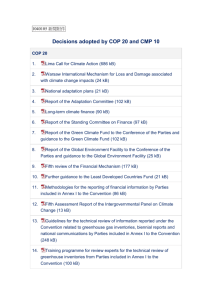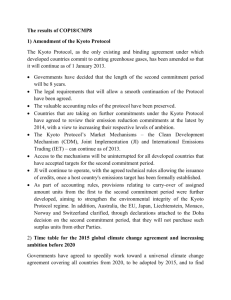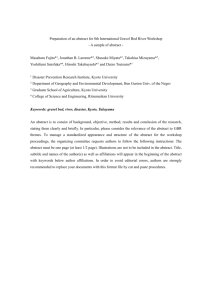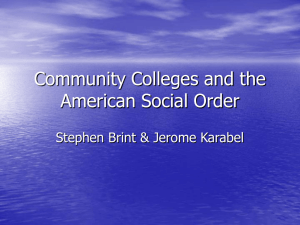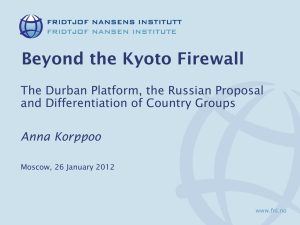6_BASIC _China _COP_CMP
advertisement
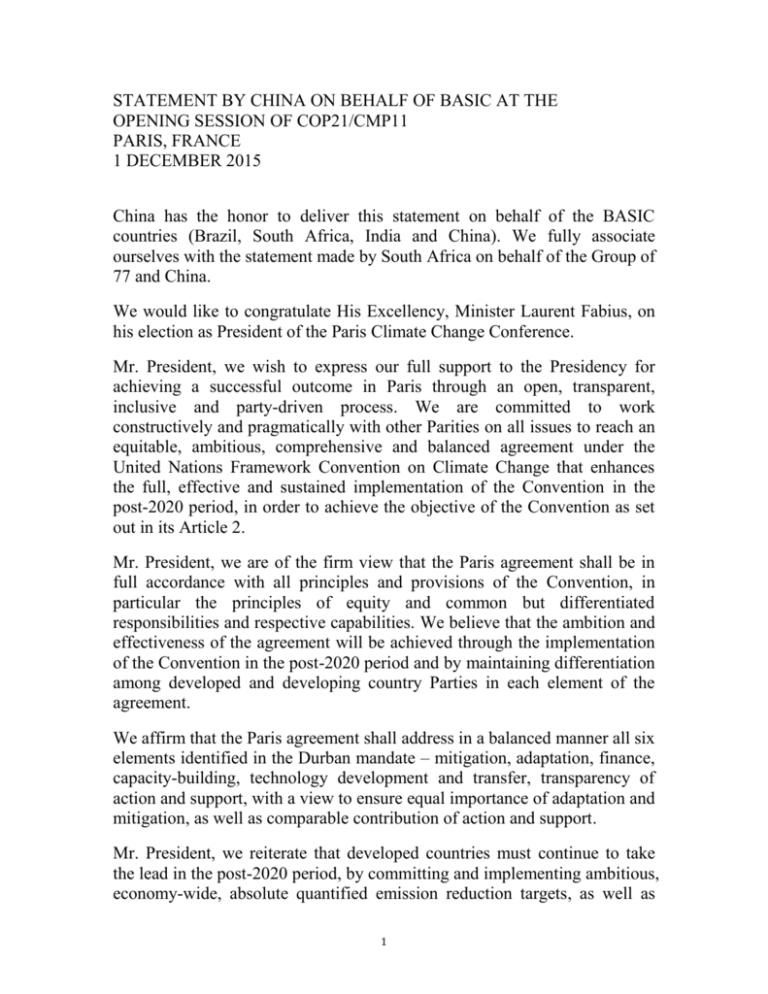
STATEMENT BY CHINA ON BEHALF OF BASIC AT THE OPENING SESSION OF COP21/CMP11 PARIS, FRANCE 1 DECEMBER 2015 China has the honor to deliver this statement on behalf of the BASIC countries (Brazil, South Africa, India and China). We fully associate ourselves with the statement made by South Africa on behalf of the Group of 77 and China. We would like to congratulate His Excellency, Minister Laurent Fabius, on his election as President of the Paris Climate Change Conference. Mr. President, we wish to express our full support to the Presidency for achieving a successful outcome in Paris through an open, transparent, inclusive and party-driven process. We are committed to work constructively and pragmatically with other Parities on all issues to reach an equitable, ambitious, comprehensive and balanced agreement under the United Nations Framework Convention on Climate Change that enhances the full, effective and sustained implementation of the Convention in the post-2020 period, in order to achieve the objective of the Convention as set out in its Article 2. Mr. President, we are of the firm view that the Paris agreement shall be in full accordance with all principles and provisions of the Convention, in particular the principles of equity and common but differentiated responsibilities and respective capabilities. We believe that the ambition and effectiveness of the agreement will be achieved through the implementation of the Convention in the post-2020 period and by maintaining differentiation among developed and developing country Parties in each element of the agreement. We affirm that the Paris agreement shall address in a balanced manner all six elements identified in the Durban mandate – mitigation, adaptation, finance, capacity-building, technology development and transfer, transparency of action and support, with a view to ensure equal importance of adaptation and mitigation, as well as comparable contribution of action and support. Mr. President, we reiterate that developed countries must continue to take the lead in the post-2020 period, by committing and implementing ambitious, economy-wide, absolute quantified emission reduction targets, as well as 1 progressively and substantially scaling up their finance, technology and capacity-building support to developing countries for their ambitious mitigation and adaptation actions under the Paris agreement, with existing commitments as a starting point. Regarding the pre-2020 ambition, we note with concern that pre-2020 ambition gaps exist not only in mitigation, but also in adaptation, finance, technology and capacity-building support to developing countries. It is important that our developed country partners to honor and fulfill existing commitment and obligations and to raise the ambition significantly as required by science and equity. We urge developed countries to provide new, additional, predictable and adequate financial resources to developing countries in a measurable, reportable and verifiable manner, in particular defining a clear roadmap and pathway towards achieving their goal of providing USD 100 billion per year by 2020. We call for a strong, comprehensive and meaningful decision on pre-2020 ambition in Paris with a view to laying a solid foundation for post-2020 enhanced action. Mr. President, with regard to the CMP of the Kyoto Protocol: We believe the Kyoto Protocol is a very important step and instrument to implement the Convention: a legally binding, rules-based, developed and developing countries cooperative system that embodies the principle of equity, CBDR&RC. Now we are in Paris to negotiate 2015 agreement to enhance the implementation of the Convention after 2020. We think the successful aspects of the Kyoto Protocol, such as the adherence of the principle equity, CBDR & RC, the cooperative mechanism between developed and developing country parties, etc, should be reflected in the Paris Agreement. No matter what agreement we shall achieve in Paris, we should not undermine the second commitment period of the Kyoto Protocol so as to ensure the environmental integrity of the KP. Meanwhile, we wish to express our concerns in the following three areas: Firstly, some Annex I countries have chosen to meet their 2020 targets outside the Kyoto framework. We would urge these countries to show their commitment to the principles of the Convention by signing up to the second commitment period or to make comparable reduction commitment under the Convention. We congratulate those Annex I Parties, which remain committed to the KP, and are participating fully in the second commitment period. 2 Secondly, we are concerned that only seven Annex I Parties have ratified the Doha Amendment to the Kyoto Protocol so far although three years have elapsed after the adoption of the Doha Amendment in 2012. We urge those Annex I Parties that have not ratified the Doha Amendment to make additional efforts towards the ratification of the Doha Amendment so as to implement the Doha Amendment as soon as possible. Thirdly, we must register our disappointment at the unwillingness of the developed country parties to increase their ambition to reduce GHG emissions under the second commitment period of the Kyoto Protocol. We believe that the High-Level Ministerial Roundtable in June last year did not deliver the expected increase in the ambition. We note with concern that no developed country Party expressed their intention to increase their commitment in last year roundtable discussion and that the developed country parties did not even want to discuss this matter as demonstrated in Lima, Peru last year. We urge them to honor this commitment to increase their ambition they made in Doha. Since commitments made by Annex I Parties to 2020 fell significantly short of what is required by science, which has been reconfirmed in the IPCC Fifth Assessment Report, we propose that this becomes a regular process. We support the proposal made last year by the G77 and China to set up a contact group under the CMP to consider this matter and to ensure that a real increase in the ambition of Annex I Parties will happen soon. Mr. President, the BASIC countries underscore the importance of consensus-based decisions under the UNFCCC and reaffirm our commitments to preserve the negotiation process that is open, transparent, inclusive and Party-driven. Finally, we look forward to fruitful engagements by all Parties and pledge our constructive participation in this session. We look forward to working with you and all Parties to ensure a successful conference. Thank you. 3
